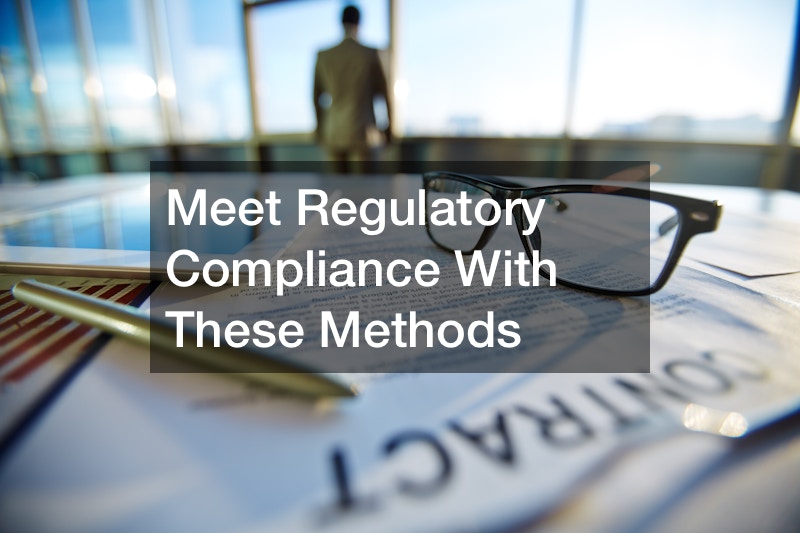Meet Regulatory Compliance With These Methods


Regulatory compliance involves businesses following laws and regulations set by state, federal, and international authorities. It ensures a safe work environment and fair hiring practices. The specific requirements vary by industry and type of business. It differs from corporate compliance, which focuses on internal policies.
Both types promote accountability. Meeting compliance can be a competitive advantage. Efficient compliance enables faster production of high-quality products.
While compliance is sometimes viewed as an obstacle, it has been proven that meeting regulatory requirements can provide a competitive edge. Efficient compliance allows companies to produce high-quality products faster than competitors. Thus, compliance becomes a valuable tool for success.
Achieving Regulatory Compliance and Standards
To meet compliance and uphold quality standards, you must understand that this responsibility extends beyond the quality department. To ensure corporate compliance with regulations from organizations like the FDA and global standards, every department within the company should be involved. Collaboration and effective communication are key to conveying the significance of meeting regulatory requirements. Here are seven ways that can guide you in this process.
1. Creating and Maintaining Policies and Procedures
Tracking employee engagement with policies is vital. Implementing a system to document when employees have read and acknowledged policies can mitigate company liability. Being able to provide evidence that employees have reviewed and comprehended the policies strengthens the company’s compliance stance.
2. Keep a Thorough Documentation
Proper document control and management processes are vital for FDA compliance and meet ISO 13485 guidelines. Companies must effectively document all changes, encompassing various elements such as numbers, diagrams, charts, specifications, plans, checklists, standard procedures, and computer files. Any oversight, no matter how minor, in the documentation process can have far-reaching implications for compliance. Maintaining meticulous attention to documenting all aspects of operations is critical to ensure compliance and minimize risks.
3. Implementing an Effective Quality Management System (QMS)
Implementing an electronic Quality Management System (eQMS) is crucial for effectively managing quality and compliance in regulated environments. Automating processes through an eQMS improves efficiency, accelerates product delivery, and ensures compliance. By moving from a paper-based system to an automated eQMS, companies can enhance manufacturing efficiency, product quality, and speed to market while adhering to regulatory requirements and ISO standards.
4. Integrating a Training Software System
Training plays a vital role in achieving compliance, and companies can effectively promote quality improvement by offering ongoing training on quality-related tasks and tools. Regulatory bodies, including the FDA, consider training as a crucial requirement, making it imperative for companies to prioritize this area. By implementing an automated training system, companies can reduce audit time and findings, minimize the risk of product recalls, and ensure compliance with FDA and ISO standards.
5. Operating in a Validated Environment for FDA Compliance
Running in a Validated Environment: FDA-regulated companies utilizing automated quality management systems must validate their systems through tests like IQ, OQ, and PQ, which can be costly and challenging. Re-validation is required for system upgrades or changes. Implementing an automated system with Transfer Operational Qualification (TOQ) allows companies to leverage their software vendor’s expertise, operate in a validated environment, and provide documented proof of compliant results, reducing audit time and findings while ensuring regulatory compliance.
6. Being Prepared for Regulatory Audits with Audit Management Software
Preparing for regulatory audits is crucial for company success, ensuring compliance and product quality. Implementing audit management software simplifies audit-related tasks, allowing for easier generation of accurate reports and trends for auditors. With analytics and reporting capabilities, including customizable reports and real-time views, management can efficiently analyze data and gain comprehensive insights into the audit process.
7. Growing Importance of a Corporate Compliance Officer
The role of this officer is increasingly crucial in today’s business environment. The CCO serves as a champion of corporate integrity, accountability, and ethics. Their primary responsibility is to stay updated on evolving regulations, make compliance decisions, establish policies and procedures, conduct risk assessments, and foster a culture of compliance throughout the organization.
Drive Success Using Strategies for Accountability and Efficiency
Meeting regulatory compliance is crucial for businesses to ensure a safe and non-discriminatory work environment while adhering to industry-specific regulations. It can provide a competitive advantage by promoting accountability and efficiency. Appointing a compliance officer like David R. Hill ESQ. who specializes in alternative dispute resolution and corporate investigations, is essential for successfully meeting compliance and thriving in a highly regulated environment.


